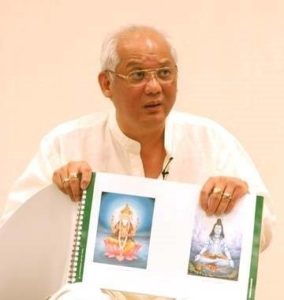In today’s day and age just about everyone has heard the word meditation. However, along with the growing awareness, there remain several misconceptions that are prevalent about the concept – especially among beginners or those who’ve only heard or read about it. A few common misconceptions include notions like it is very difficult to meditate, meditation is unscientific, it is for old people only, it will distract me for my career and work, and I will have to give up a lot of stuff. Most of these are simply preconceived notions without much substance or fact. In a previous article we had discussed What Exactly Is Meditation? In this article we attempt to address and bust some of the common myths about meditation.

Shattering the Myths
Myths about Meditation #1- Meditation is difficult: One of the most common reasons for people to not practice meditation is that they find it very difficult to concentrate for a long time without having any thoughts. The issue here is that it’s not the meditation that is difficult, but what people think meditation is supposed to be!
Meditation is not just about concentrating on one thought. The mind produces thousands of thoughts everyday on a continuous basis. We’re not aware of most of these thoughts, because in today’s fast-paced lifestyle, we’re constantly involved in one activity or another, and multitasking is becoming the norm in the corporate world.
However, when we sit down in silence with our eyes closed and withdraw our attention from the outside world, it’s natural to be aware of what’s within – the thousands and thousands of thoughts lurking in some corner of our mind.
If we meditate with the idea of not having even a single thought, we’re bound to end up resisting the thoughts which are going on in our mind. Most people are busy fighting these thoughts instead of following the meditation technique. Of course it will be difficult and not produce the desired result.
Stop fighting, and enjoy the meditation!
Myths about Meditation #2 – Meditation will distract me from my career/work: Another misunderstanding is that a person might tend to become aloof or averse to material life due to the bliss and peace experienced during meditation. It might distract them from their work.
Meditation removes distractions, and not the other way around! It enables us to rise above our past failures and anxiety about the future, and focus on the work at hand. The purpose is not to escape from the real world and stay in an insulated environment. Anybody can remain calm sitting on a mountain top. The idea is to remain calm and focussed even during times of crisis.
Some of the most successful people in the field of business, science, art, music, sports and other walks of life are regular meditation practitioners.
Myths about Meditation #3 – Meditation is for renunciates or old people with slow-paced lives: It is often assumed that meditation is just about sitting still and doing nothing. Nothing could be further from the truth!
Meditation has been seen to consistently boost performance and productivity. In fact, it’s more important during the busiest times, because that’s when we require the extra boost the most. The youth, with busy lifestyles and stressful jobs, are the ones who benefit from it the most!
Myths about Meditation #4 – Meditation is unscientific: Many people consider meditation unscientific because it is difficult to quantify the transformation which one undergoes by using something abstract and intangible. However, modern research has shown tremendous benefits of meditation on health, brain activity, quality of life and performance.
Many medical practitioners and scientists have started accepting and even inculcating meditation as part of their routine.
Myths about Meditation #5 – You have to give up “stuff”: Many people are scared to venture out and meditate because they feel that they will end up having to give up a lot of stuff they hold dear. This myth is possibly grounded in some degree of reality. With meditation one does give up stuff.
Stuff that we give up after meditating includes (but is not limited to) the following:
- You will give up the need worry obsessively
- You will give up the commitment to be stressed out all of time
- You will give up the excuses to be unhappy
- You will give up emotions which are not refined (such as anger, irritation and anxiety)
- You will give up fear, doubt and low self-esteem
- You will give up emptiness
In conclusion, it is true that you will give up stuff. It will improve your life. It will help you become a better person. It is finally about making a choice about if the stuff to be given up is worth keeping in your life or not.
Give Meditation a Shot
One of the simplest, but most powerful meditation techniques is the Meditation on Twin Hearts. This short 21-minute guided meditation, with easy-to-follow steps, is perfectly suited to the modern lifestyle. Regular practitioners have consistently reported various positive changes like a sense of inner peace, greater productivity, better health and harmonious relationships, to name a few.
Like anything else, you need to try it with an open mind and experience it for yourself to see the benefits. We joyfully urge you to give meditation a shot. YVPHFWB holds regular introductory sessions every Friday evening at 6.00 pm IST for those interested in learning this powerful meditation. These sessions are conducted free of charge. We cordially invite you to join us to experience the Meditation on Twin Hearts for yourself.


0 Comments